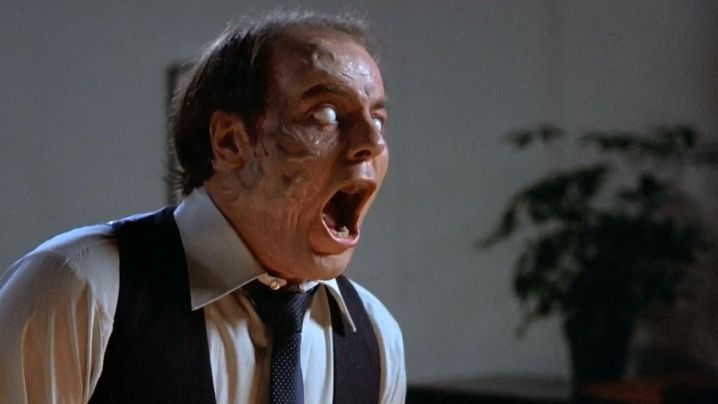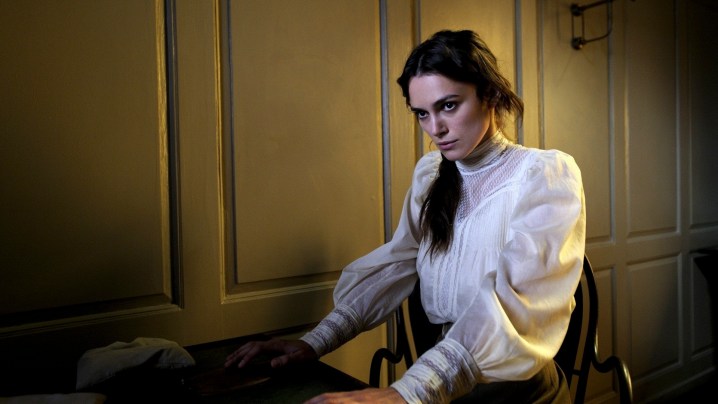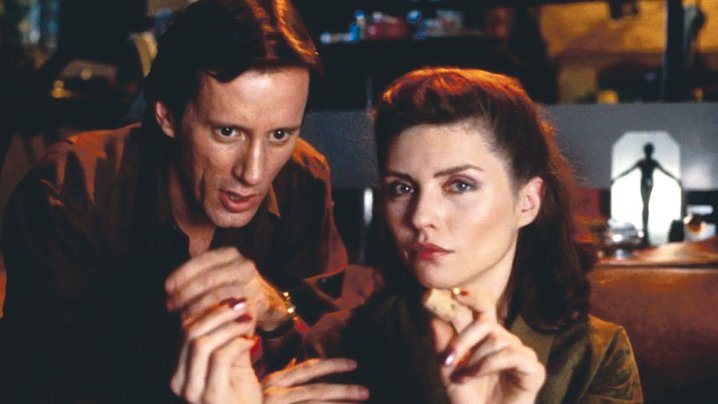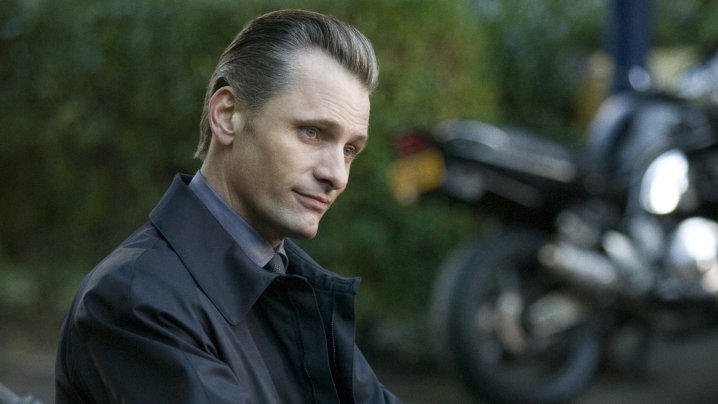If you’re Canadian auteur David Cronenberg, purveyor of oozy body horror, psycho-sexual titillation, and all manner of other subversive content, it’s hard to imagine better pre-release hype around your new film than numerous reports of nauseated audiences fleeing screenings. Of course, this was the Cannes Film Festival, where people enjoy walking out of movies for virtually any provocation. And the movie, Crimes of the Future, once widely reviewed, proved to be not quite as repugnant as those early reports described, despite its graphic depiction of organ removal surgery as live entertainment.
Still, the fact remains that few filmmakers alive could stir up such pre-release controversy. Even after not having made a feature film since 2014 — and not one in this vein for several decades — people knew exactly what they were getting into with a David Cronenberg movie. (The horrible goop mutants in the animated comedy series Rick and Morty are called Cronenbergs if that gives you some indication of the associations conjured by the man.) In celebration of the master’s return to the splendidly sickening, we list his best films according to Rotten Tomatoes.
10. Scanners (1981) – 70%

Exploding heads! Well, one exploding head anyway. At least that’s what people typically remember about Scanners, Cronenberg’s first mainstream success in the United States (it grossed over $14 million on a $budget of 3.5 million) after a decade of making films and television for Canadian audiences, including early body horror films such as Shivers and Rabid.
The movie shares its basic premise with X-Men, The Boys, and any number of other sci-fi stories about evil corporations that try to control and weaponize “special” people — in this, case individuals who possess both telepathy and telekinesis (the ability to move objects with the mind). This isn’t surprising, given that Cronenberg read comic books as a boy. Critics found the movie uneven, but appreciated the director’s exploration of themes of social control and human biological evolution that he would develop throughout his career.
9. eXistenZ(1999) – 74%

One of four films that Cronenberg made in the ’90s (following Naked Lunch, M. Butterfly, and the notorious Crash, about people who become aroused by car accidents), eXistenZ was the last movie in which the director would explore themes of body horror and biotechnology (here including “organic pistols” that resemble pieces of KFC extra crispy chicken) until Crimes of the Future. Cronenberg also found an opportunity to push his concerns about corporate media control and loss of individual subjectivity into the realm of virtual reality.
eXistenZ stars Jennifer Jason Leigh as a VR game designer who, with the help of a publicist (an absurdly young-looking Jude Law), enters her game in the hopes of saving it from sabotage. The movie shares a number of narrative similarities to The Matrix, also released in 1999, especially in the use of “bio-ports” to connect humans to the virtual world and the blurring of fantasy with reality. Although it doesn’t remotely match the stunning aesthetic of The Matrix, critics found its exploration of classic sci-fi themes, just as thoughtful, if not more so.
8. A Dangerous Method (2011) – 78%

Along with Cosmopolis (2012) and Maps to the Stars (2014), Cronenberg made A Dangerous Method during a stretch when he appeared to have left behind the graphic body horror material of his first few decades, and even the more standard violence of his twin noir crime films, A History of Violence and Eastern Promises (both ranked below).
His preoccupation with psycho-sexual drama (in movies like Crash and Dead Ringers) remained, however, in this period movie starring Keira Knightley as a woman who suffers from “hysteria” and gets turned on by spanking. Who better to unpack all this for her than eminent doctors Freud and Jung, who — as played by Viggo Mortensen and Michael Fassbender, respectively — were evidently way hunkier than history ever taught us! Some critics found the film a bit dry by Cronenberg’s standards, though many singled out the performances as exemplary, particularly Knightley’s.
7. Videodrome (1983) – 79%

Videodrome stars James Woods in gonzo mode (wait, is there any other James Woods mode?) as the head of a Toronto UHF station who agrees to broadcast a snuff film before trying to track down the film’s mysterious origins. The movie is a commentary about the pernicious persuasive power of television and was among the early Cronenberg films to establish the director as an enthusiastic emcee of body horror fantasies.
Though securing decent reviews, particularly for the special effects, Videodrome was a bomb in theaters. How could it not have during a movie-going era that prized shallow spectacle? But, along with Scanners, it is one of the films that secured Cronenberg’s reputation as a cult auteur. Given its status as the early work of a master, as well as the visionary cautionary material about how we consume and interact with media, it remains much better remembered now than much of the disposable dreck from 1983.
6. Dead Ringers (1988) – 83%

Jeremy Irons famously thanked Cronenberg when he won an Oscar for Reversal of Fortune two years after the release of Dead Ringers, as if to say, “this is the film I should have won for” (he wasn’t even nominated). It’s hard to argue the point. Almost 35 years later, his dual performance as twin gynecologists who spiral into drug addiction and madness stands as one of the great feats of movie acting. It’s not just that Irons makes Elliot and Beverly Mantel so convincing as separate characters — Elliot is imperious, composed, and sociopathic, while Bev is fickle, volatile, and tender — but how committed he is to depicting their behavior in all its creepy revulsion.
The movie suggests that the twins may have been conjoined at some point, and although they were separated physically, they never detached from each other psychologically. When they finally begin that process, it rips them asunder all over again. Irons’ cold, clinical precision is matched by Cronenberg’s approach to the direction, which holds the horror at arm’s length as long as possible before completely surrendering to it.
5. Spider (2002) – 85%

With Spider, Cronenberg revisited the realm of the psychological thriller he mastered in movies like Dead Ringers and Naked Lunch to tell the story of a schizophrenic man, Dennis “Spider” Cleg (Ralph Fiennes), who is released from a London mental institution into a halfway house. There, his mental condition deteriorates again quickly, precipitating his tumble into a well of traumatic childhood memories that include his murderous father (Gabriel Byrne).
Spider was well-reviewed upon its release — Film Comment even named it one of the best films of all time — with critics singling out Fiennes’ performance, even while finding the movie a bit slow overall. Unfortunately, the movie is not currently available to stream and it’s hard to find DVD versions as well, as no Blu-Ray edition has yet been released. Given that it’s considered among the best work of both Fiennes and Cronenberg (and a labor of love, for which they earned no salary), it seems likely that the film will find its way to viewers again before long.
4. A History of Violence (2005) – 87%

Cronenberg earned rave reviews for this foray into the crime genre that would begin his transition into more conventional fare (at least for him) for the next decade and a half. The movie stars Viggo Mortensen as a small-town family man, Tom Stall, whose quick thinking during a robbery gains him national attention as a hero. Unfortunately, his new visibility brings some bad men to town who think he used to belong to a Philadelphia mob family. Tom must stave off this threat while keeping the secrets of his past from his unwitting family.
Critics appreciated Cronenberg’s taut direction, as well as his thoughtful exploration of how human beings are simultaneously repulsed by, and attracted to, violence. Reviewers also praised the performances by Mortensen, Mario Bello, Ed Harris, and especially William Hurt, who earned an Oscar nomination for Best Supporting Actor with just over 8 minutes of screen time.
3. Eastern Promises (2015) – 89%

This one might have been called “A History of Violence, Russian Edition.” Mortensen again stars, this time as Nikolai, a low-level driver for the Russian mafia in London who tries to help a midwife, Anna (Naomi Watts), locate the family of a baby whose teen mother has died giving birth to her. As Anna’s investigation leads her deeper into Nikolai’s world of crime, he must decide if his loyalties lie with her or his bosses: The lethal head of the Russian family (Armin Mueller-Stahl) and his sniveling son (Vincent Cassel, in classic sociopath mode).
Critics praised Cronenberg’s fluid filmmaking and beautiful cinematography, which conjures rain-slicked London streets and the richly burnished back rooms and restaurants where the mob operates. Mortensen got the Oscar nomination this time, for Best Actor, while the movie became known for its classic fight scene between naked men in a bathhouse — the bronzed flesh and crimson blood in stark contrast to the gleaming white marble of the bathhouse floor.
2. The Dead Zone (1983) – 90%

Cronenberg got the job directing the adaptation of Stephen King’s best-seller after the success of Scanners, though it’s a much less funky picture. In fact, given the pedigree of weird working together here — Cronenberg, King, and Christopher Walken — The Dead Zone is a very earnest picture. Walken plays a man, Johnny, who wakes up after five years in a coma only to discover that he has developed the ability to see people’s past and future. Now, of course, everybody wants a piece of him, including a local cop (Tom Skerritt) who needs help ferreting out a serial killer. When Johnny comes into the orbit of a crooked politician (Martin Sheen, doing his best Nixon impersonation), he must decide how far he’s willing to go to ward off a potentially catastrophic future.
Critics appreciated the story, Cronenberg’s unobtrusive direction, and Walken’s strong central performance, even if they were a bit surprised that this movie is more sweet than strange.
1. The Fly (1986) – 93%

The Fly is still probably Cronenberg’s most famous film, one of the rare remakes which has eclipsed the reputation of the original, a 1958 chiller with Vincent Price. Of course, this is largely to do with the special effects, which remain among the most stomach-churning and inventive in all of horror cinema. As with John Carpenter’s The Thing, this kind of freaky human-engineered prosthetic goop simply cannot be replicated with digital FX.
The movie stars Jeff Goldblum as a scientist who invents a teleportation device. When he tests it on himself, it appears to be a success, but only later does he realize that a fly had buzzed into the chamber with him. The ensuing complications…well, even people who haven’t seen the movie are probably familiar with the gross-out makeup that transforms a man into a fly. Critics praised The Fly as one of the most successful visceral and elemental of Cronenberg’s body horror scenarios and acclaimed Goldblum’s performance along with that of Geena Davis as a sympathetic journalist and love interest. The Fly remains Cronenberg’s most, um, buzzed-about achievement.
Editors' Recommendations
- Does the sci-fi classic Alien have the best movie marketing campaign ever?
- Wait, David Lynch directed a commercial for the Sony PlayStation?
- 7 obscure sci-fi movies from the 1980s you need to watch
- The best Harry Potter movies, ranked by Rotten Tomatoes
- The 7 best cabin horror movies ever, ranked




